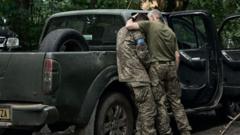Recent testimonies from Ukrainian soldiers depict their chaotic retreat from the Kursk region, where they faced incessant drone attacks and mounting casualties. This account unveils the dire plight of ground forces as they grappled with significant logistical challenges and rapidly shifting front lines.
**Ukrainian Soldiers Reflect on Harrowing Retreat from Kursk Front Lines**

**Ukrainian Soldiers Reflect on Harrowing Retreat from Kursk Front Lines**
Ukrainian troops share gut-wrenching accounts of their strategic withdrawal amidst overwhelming Russian assaults in Kursk.
In a vivid portrait of turmoil from the front lines, Ukrainian soldiers have articulated their traumatic experiences as they retreated from the Kursk region. The soldiers, who conversed anonymously via social media, conveyed their accounts with emotional depth, describing the horror of their withdrawal under fire from Russian forces.
One soldier, "Volodymyr," outlined the desperate circumstances on March 9 as he witnessed panic and chaos among Ukrainian troops in Sudzha, a key town they had recently lost control over. He characterized the relentless drone attacks as overwhelming, claiming that the soldiers' movements on essential routes had been compromised, effectively cutting off their ability to safely evacuate.
Reportedly, by March 11, "Maksym" communicated dire updates, indicating that their forces were losing the critical Sudzha-Sumy road to the enemy. He mentioned the alarming buildup of Russian troops, estimated at approximately 70,000, including North Korean soldiers. The deployment of advanced drone technology exacerbated their struggles, as these drones executed precision strikes against Ukrainian assets.
On the same day, "Anton," stationed at the Kursk headquarters, affirmed that the situation was spiraling downwards, and logistical support had collapsed, making it nearly impossible for Ukrainian forces to receive essential supplies. He managed to escape only under the cover of night while evading constant drone surveillance.
The withdrawal was profiled in stark detail by "Dmytro," who recounted the traumatic experience of losing fellow soldiers and the sheer devastation of their surroundings, where wrecked vehicles littered the roads. With a chilling acknowledgment, he conveyed that the situation turned from "critical to catastrophic,” ultimately concluding that the operations in the Kursk region had failed.
Conversely, "Artem," recovering from injuries in a military hospital, offered a glimmer of resilience, affirming that Ukrainian troops were still organized around critical areas like Loknya, where they were putting up fierce resistance.
While General Oleksandr Syrskyi claimed that Ukrainian forces had strategically repositioned themselves, and maintained control in Kursk, a stark reality emerged: substantial territorial gains had rapidly dissipated. President Volodymyr Zelensky acknowledged the operation's intended goals but left questions lingering regarding the true costs of such a campaign.
As the tides of war continue to reshape the dynamics in the region, the experiences of these Ukrainian soldiers shed light on the heart-wrenching realities faced on the battlefield amidst ongoing confrontations with Russian forces.
One soldier, "Volodymyr," outlined the desperate circumstances on March 9 as he witnessed panic and chaos among Ukrainian troops in Sudzha, a key town they had recently lost control over. He characterized the relentless drone attacks as overwhelming, claiming that the soldiers' movements on essential routes had been compromised, effectively cutting off their ability to safely evacuate.
Reportedly, by March 11, "Maksym" communicated dire updates, indicating that their forces were losing the critical Sudzha-Sumy road to the enemy. He mentioned the alarming buildup of Russian troops, estimated at approximately 70,000, including North Korean soldiers. The deployment of advanced drone technology exacerbated their struggles, as these drones executed precision strikes against Ukrainian assets.
On the same day, "Anton," stationed at the Kursk headquarters, affirmed that the situation was spiraling downwards, and logistical support had collapsed, making it nearly impossible for Ukrainian forces to receive essential supplies. He managed to escape only under the cover of night while evading constant drone surveillance.
The withdrawal was profiled in stark detail by "Dmytro," who recounted the traumatic experience of losing fellow soldiers and the sheer devastation of their surroundings, where wrecked vehicles littered the roads. With a chilling acknowledgment, he conveyed that the situation turned from "critical to catastrophic,” ultimately concluding that the operations in the Kursk region had failed.
Conversely, "Artem," recovering from injuries in a military hospital, offered a glimmer of resilience, affirming that Ukrainian troops were still organized around critical areas like Loknya, where they were putting up fierce resistance.
While General Oleksandr Syrskyi claimed that Ukrainian forces had strategically repositioned themselves, and maintained control in Kursk, a stark reality emerged: substantial territorial gains had rapidly dissipated. President Volodymyr Zelensky acknowledged the operation's intended goals but left questions lingering regarding the true costs of such a campaign.
As the tides of war continue to reshape the dynamics in the region, the experiences of these Ukrainian soldiers shed light on the heart-wrenching realities faced on the battlefield amidst ongoing confrontations with Russian forces.




















